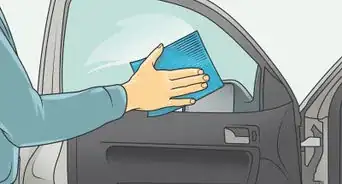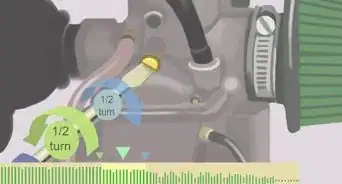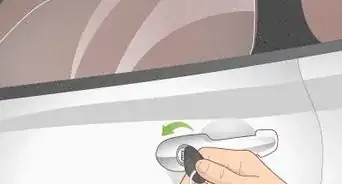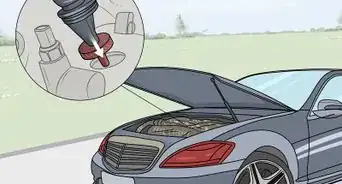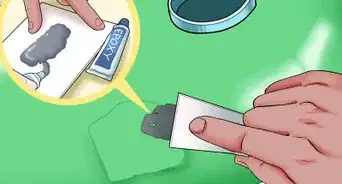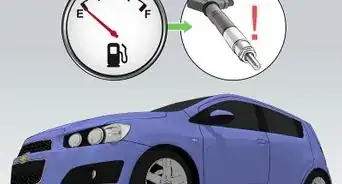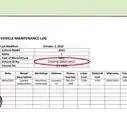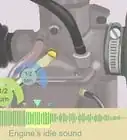This article was co-authored by Chad Zani. Chad Zani is the Director of Franchising at Detail Garage, an automotive detailing company with locations around the U.S. and Sweden. Chad is based in the Los Angeles, California area and uses his passion for auto detailing to teach others how to do so as he grows his company nationwide.
wikiHow marks an article as reader-approved once it receives enough positive feedback. In this case, 86% of readers who voted found the article helpful, earning it our reader-approved status.
This article has been viewed 518,531 times.
Usually, tinted car windows block the ultraviolet sunlight rays that can harm your skin. They also offer privacy from people looking into your car. While tinting is a long, time-consuming process, most people can tint their own windows with only a few basic tools.
Steps
Preparing the Windows
-
1Find a clean, dry work space. You need a clean environment to prevent dust and dirt from mixing with the tinting. Doing everything indoor is not a bad idea. But if you want to work outside, you should choose a clean and dry place.[1]
-
2Remove any stickers or adhesives from the windows. Remove any stickers inside of your car screen and clean off all the adhesives or any sticky things that can create problems with the film sticking on the windows. Remove all the obstructions inside the car that can restrict your process and get in your way. Finally, vacuum the interior to get rid of dust.[2]Advertisement
-
3Clean up the windows using soapy water and a 1" razor blade. Lower the window slightly so that you can get the top as well. Mix a few drops of dish soap with warm water and spray or wipe it on the window, then use the blade to scrape away all the dirt and grime. Make sure you clean both sides of the window well, removing everything.
- Never use Windex, or cleaner with ammonia in it. It will tint your windows purple when you're done.
- Make sure you get all the edges and seals, and role the window up to get the bottom.
- You're going to need almost a gallon of soapy water throughout this process. Prepare the water ahead of time to make working easier. A spray bottle is highly recommended.
-
4Take a clean rag and dry the window. Wipe away the soapy water on both sides and dry off the edges as well. If you're using a spray bottle, refill it with more soapy water. A squeegee will help you get the window completely dry.[3]
- You will need a plenty of soapy water to ensure that the tint doesn't stick or rip.
- Make sure you get underneath the seals in the interior of the car. Use your finger to get under the seal and remove dirt and dust.
-
5Roll the window back up before beginning, but leave your car on. You'll need to move the window up and down as you work. For now, leave it up.
-
6Determine which side of the tint is adhesive. Like a sticker, the tint has a layer that can be peeled off right before adhering it to the window. Make sure, as you work with the tint, that this side is facing you.
Cutting and Measuring Your Tint
-
1Spray the outside of the window with soapy water. The water will help the tinting temporarily adhere, but still make it slippery enough to slide around and put into place.[4]
-
2Place the tinting over the outside of the window so that it covers the entire window. Unroll your tinting so that it covers the entire window, with at least 2-3" of extra tinting over the edges. The liner (the part that will later adhere to the window), should be facing you.
- Make sure you do not remove the liner -- you're just sizing and pressing the tinting right now, now adhering it.
EXPERT TIPChad Zani is the Director of Franchising at Detail Garage, an automotive detailing company with locations around the U.S. and Sweden. Chad is based in the Los Angeles, California area and uses his passion for auto detailing to teach others how to do so as he grows his company nationwide.Auto Detailing Expert
 Chad Zani
Chad Zani
Auto Detailing ExpertOur Expert Agrees: The simplest method for sizing the tinting is to place it over the outside of the window. You'll cut the correct size, and then you move the tinting to the inside for adhesion. Make sure you're sizing the tinting in reverse. Tinting only has one usable side, so you need to size and cut the tinting in the opposite direction so that it fits properly on the inside.
-
3Cut away a manageable slab of tinting. You should have a few inches of extra tint in every direction, but you don't want to be maneuvering the entire roll of film while working. Use a precision knife or blade to cut a usable square of tinting film from the larger role.[5]
-
4Spray the front of the film with water. Once the tint is cut into a square, it should stick to the water on the outside of the window. You should then spray the tint itself so that the entire thing is covered in a thin layer of soapy water.[6]
-
5Take your knife and cut along the bottom and left edges of the window. Simply use the edges of the window to trace your knife across the tinting film. You want a perfectly shaped line to ensure the tint fits. When done, two of the edges should fit perfectly, and the rest should still be square.
- As you cut, use the squeegee or your free hand to make sure the film is flush with the window.
- When done, cut the excess film away and discard.
-
6Pull the film 1" towards the left edge. You want to shift the film towards the edge you just cut. This ensures that you have enough tint to cover every edge of the window, including the part covered by the seal.
-
7Cut the right edge, then slide the tint halfway back towards the center. Once you slice the right edge off, pull the tint partially back to the center, so that there is roughly 1/2" of extra tinting film on either side of the window.[7]
-
8Pull the film down roughly one inch, so the bottom edge is lower than the window. This is the tint that will eventually go into the door, allowing you a better light seal. Slide it down and then use the squeegee to flatten it again. You'll be doing the same thing you just did with the right and left side on the top and bottom edges.[8]
-
9Lower the window a half inch, then use the top of the window to cut the film to shape. Once the window is lowered, you can use this top edge of the window as your guide. Use the precision knife to cut right to the top of the window. When done, pull the tint back towards the center. You should have roughly 1/2" of extra film on every side of the window.
-
10Clean up any of the corners that have excess film. When cutting away, the corners may have bits and pieces of extra film in the corners. Use your knife to clean it all up.[9]
-
11Realign your film so that it fits the window perfectly, with some excess on every edge. You may need to reapply water to make it stick. If so, remove the cut tint, spray some more soapy water, and reapply the film to the window.[10]
-
12Working from the top down, use a heat gun and a hard card to push the bubbles to the bottom. Get out all the air and water by working from the top downward. Smooth the entire film out on the outside of the window. As you push to the bottom, you'll see zig-zagging from the "fingers" of air still stuck in the film. This is a good sign. Keep pushing downward, then run the heat gun along the bottom of the window to make sure it is all dried out.[11]
- You can leave the tint stuck to the outside of the window now. You'll have to prep the inside window a bit more, so this is a good place to ensure that the tint stays dust free.
Adhering the Tint
-
1Prep the inside of the window with soapy water and a squeegee. You're going to go through a lot of soapy water in this process. You can use a hard edge to get in between the seal and the window for a better clean. When done, spray the whole window with soapy water.[12]
-
2Peel off the top half of the release liner from the tinting film. Window tint works just like a sticker. There is a removable layer that adheres to the tint and keeps the adhesive solid. You should, however, only peel off only the top half for now-- it makes it easier to work with.[13]
- Just gently work the tint between two fingers like you were snapping to get the adhesive layer off.
-
3Spray off the now-exposed section with fresh water. You are now ready to adhere the tint to the window.[14]
-
4Line up and adhere the top of the tint to the window. The water makes the tint easy to slide around, so you can get the edge of the window perfectly lined up with the top edge of the tint. Your window should still be slightly down.
-
5Slightly fold the tint to work it underneath the seal. Once the top edge is on the window, sneak the two sides into the seals to the right and left, using your fingers to get them roughly flush. With one hand, pull back the seal around the window, then use the other hand to push the film under the seal and onto the window.[15]
- Remember to keep everything doused in soapy water to make it easier to move around.
-
6Spray down the window again, then use your hard edge to push the water out the edges. Using your squeegee or hard-edge, slowly work the water out by pushing the water to the sides. Push the water out the top and sides, but don't push towards the bottom, where you have the rest of you liner waiting to be adhered.
- You should keep a hand on the tint at all times to keep it from moving as you squeegee the water out.
-
7Roll the window up, then spray the bottom half of the window with soapy water. Don't skimp on the soapy water -- it is essential to prevent the tint from sticking.
-
8Pull off the remaining release layer, then spray the exposed tint with water. Make sure both the window and the tint are wet.
-
9Use your fingers and hard edge to tuck the bottom of the tint into the bottom seal. Spray off the tint with soapy water again. This is tricky, but should be easy with a hard edge. Pull back the seal with your fingers, then use the hard edge to push the film down and onto the window.[16]
-
10Smooth out the window with your hard edge, pushing all the water and air bubbles towards the edges. Work downward and outward whenever possible, spraying the tint with more soapy water to make sure you don't rip the liner. Keep squeegeeing the water out of the tinting so that it is smooth, as if it was just a part of the window.[17]
Our Most Loved Articles & Quizzes
Community Q&A
-
QuestionIs it possible to get creases out of the tint?
 Uglymug18Community AnswerIt depends on how bad they are. Some can be worked out with a credit card, for others nothing can be done and you will have to start over.
Uglymug18Community AnswerIt depends on how bad they are. Some can be worked out with a credit card, for others nothing can be done and you will have to start over. -
QuestionDo I need to affix the window film on both sides of the window, or only on one side? If so, inside or outside?
 Community AnswerOne side, inside. If you want it to look decent I suggest watching a YouTube video on the subject. If you want it done well, just pay someone who does it for a living; it's only about $100 - 200.
Community AnswerOne side, inside. If you want it to look decent I suggest watching a YouTube video on the subject. If you want it done well, just pay someone who does it for a living; it's only about $100 - 200. -
QuestionWhat if I don't have the tools?
 Community AnswerHire someone who does. The ownership of the proper tools is part of the reason everybody doesn't do it themselves, and is what makes the installer a professional.
Community AnswerHire someone who does. The ownership of the proper tools is part of the reason everybody doesn't do it themselves, and is what makes the installer a professional.
Warnings
- Different countries have different rules and regulations regarding the tinted windows on the passenger vehicles. Be sure to check the legal amount of tinting available in your state or country.⧼thumbs_response⧽
Things You'll Need
- Sponges
- Window cleaning solution of good quality
- Razor blade with single edge for the trimming purposes
- Utility knife for multipurpose
- Squeegee and the lint free cloths
References
- ↑ https://www.youtube.com/watch?v=M7UOQq3h2s8
- ↑ https://www.youtube.com/watch?v=M7UOQq3h2s8
- ↑ https://www.youtube.com/watch?v=M7UOQq3h2s8
- ↑ https://www.popularmechanics.com/cars/how-to/a10714/how-to-tint-your-own-car-windows-16878090/
- ↑ https://www.youtube.com/watch?v=M7UOQq3h2s8
- ↑ https://www.youtube.com/watch?v=M7UOQq3h2s8
- ↑ https://www.youtube.com/watch?v=M7UOQq3h2s8
- ↑ https://www.youtube.com/watch?v=M7UOQq3h2s8
- ↑ https://www.youtube.com/watch?v=M7UOQq3h2s8
- ↑ https://www.popularmechanics.com/cars/how-to/a10714/how-to-tint-your-own-car-windows-16878090/
- ↑ https://www.youtube.com/watch?v=M7UOQq3h2s8
- ↑ https://www.popularmechanics.com/cars/how-to/a10714/how-to-tint-your-own-car-windows-16878090/
- ↑ https://www.youtube.com/watch?v=M7UOQq3h2s8
- ↑ https://www.youtube.com/watch?v=M7UOQq3h2s8
- ↑ https://www.youtube.com/watch?v=M7UOQq3h2s8
- ↑ https://www.youtube.com/watch?v=M7UOQq3h2s8
- ↑ https://www.youtube.com/watch?v=M7UOQq3h2s8
About This Article
To install window tints, first clean the window you're tinting with soapy water and scrape away any dust, lint, and adhesive on it with a razor blade. Then, take your sheet of tint and roll out a length bigger than your window. Cut the section off with a razor blade or precision knife. Next, spray the outside of your window with soapy water. Hold the tint up over the outside of the window with the adhesive side facing out. Don't take the cover off of the adhesive yet. Now, press the tint onto the soapy window. Run a heat gun set to low heat over the bubbles and creases, and use the edge of a credit card to smooth out any bumpy sections. Once the tint is perfectly aligned with the window, use a razor blade or precision knife to carefully cut around the edges of your window. Remove any excess portions that overlap with the frame or trim of the window, and lift the tint off. Take the same tint and move it to the inside of the door. Clean the interior side of the window with soapy water and a razor blade so there's nothing on it that could interfere with the tint. Spray the inside of the window with soapy water one more time once you’re done. Roll your window down 1-2 inches (2.5-5 cm), and hold your tint up against the corner of the window with the adhesive facing the window. Peel the top corner of the adhesive side off. Fit it against the window pane and press down a little. Raise the window up and remove the rest of the adhesive cover. Press the tint into the glass to fit the window, and use a heat gun and credit card to remove any bubbles or creases. Repeat this process on any other windows you want to tint in your vehicle. For tips on how to determine which side of the tinting is the adhesive, read on!






